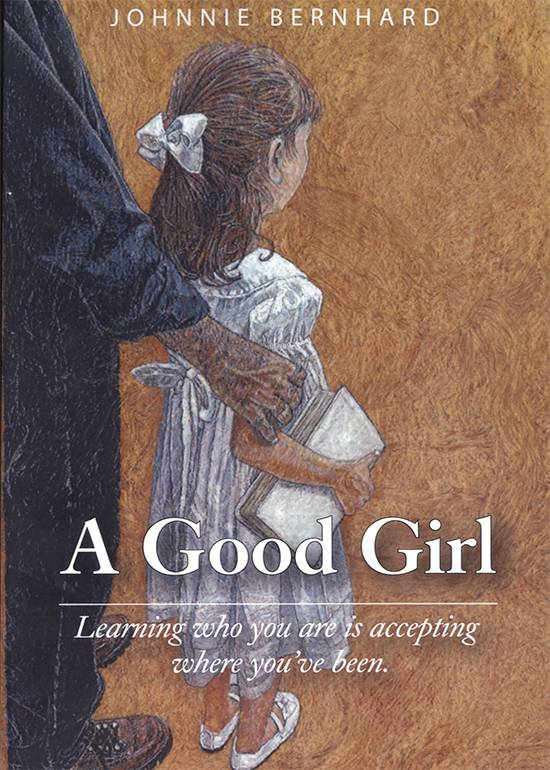
A Good Girl
by Johnnie Bernhard
Huntsville: Texas Review Press, 2017.
212 pp. $20.95 paper.
Reviewed by
Kate Boudreaux Strawther
"From the coasts of Ireland to the Gulf of South Texas and back, A Good Girl follows generations of hardworking Muellers and the sins that threaten to swallow them in a sea of blame and regret."
Fans of Pat Conroy’s The Prince of Tides and Cynthia D’Aprix Sweeney’s The Nest should feel right at home in the pages of Johnnie Bernhard’s poignant debut novel, A Good Girl. With a vivid setting and great attention to detail, Bernhard creates an intimate portrait of one family’s search for the American dream and all the hardships along the way. A verse from Exodus foreshadows the story by telling of God’s steadfast love and forgiveness reaching to the thousandth generation. However, this isn’t meant as a pardon for the guilty. For the iniquity of the parents is visited upon the children and the children’s children, to the third and fourth generation. It is this invisible fight, the ancient struggle to overcome the demons of ancestors past, that Bernhard brings to light in a way that will stay with you long after the last sentence. From the coasts of Ireland to the Gulf of South Texas and back, A Good Girl follows generations of hardworking Muellers and the sins that threaten to swallow them in a sea of blame and regret.
As the middle child of Henry and Faith Mueller, Gracey has perfected the art of being a good girl, just like the steadfast women before her. But fifty years of mending fences has taken its toll, depleting Gracey’s strength as she reflects on what it means to forgive and move past the hurt she feels from a past riddled with injustice. This pain is brought to the forefront when she is called home to South Texas to await the impending death of her father, Henry, from stage IV colon cancer. With no support from her husband or siblings, Gracey finds herself rambling around her childhood home, waiting on the inevitable. With unhappy memories at every turn, visions of her parents linger. Her father’s hands, cracked with drywall mud, holding a cut glass jelly jar of amber liquid. The blank stare of her mother, smoking cigarettes and wishing for a different life. Gracey mourns the way things should have been, but feels helpless against the wounds that aren’t easily bandaged.
With her father and her marriage both on life support, Gracey is grappling with the desire for someone to blame when she comes across a tin-type of her great-great-grandmother’s six sons. As Gracey analyzes each man in the photograph, the animosity she feels is palpable:
“Feet spread slightly apart and broad shouldered. Both hands on hips, with a slight turn of the head toward the camera. Father, son, father, son. Emil, Jonas, William, Henry, Tom. A long line of pain passing through those veins, setting the course. Then there’s the women who loved them. All they could do was pray and register another birth or death in the family Bible. There’s your reward for bringing children in the world and sticking it out in a bad marriage.”
To those who have experienced family dysfunction, A Good Girl will strike a familiar chord. It did with me. We’ve all heard the expression, “hurt-people hurt people,” but this insinuates a false narrative. Victims are not forever at the mercy of their abusers, like a broken record on repeat, inevitably becoming abusers themselves. The truth is, nothing is inevitable. No action is beyond the control of the perpetrator. To follow in the footsteps of a poor example is a decision, plain and simple, and a cowardly one at that. This is the knowledge Gracey struggles with the most. The desire to hold on to years of pent-up animosity is strong as she counts the injustices one by one, year by year. Will she forever be a good girl, the perfect middle child who spends all her energy fixing other people’s problems? Or will she assert control by choosing her own sanity over the image of perfection that chains her to the past?
I’ll be honest, this book is heavy in a way that lags a bit in the beginning. But while it took longer than I would have liked to feel truly invested in the characters, Gracey’s grit and determination to break the toxic cycle set by her ancestors is truly inspiring and worth waiting for. This is what I admire most about Bernhard’s writing: the ability to show the dark underbelly of love. The hard choices that get no recognition but are so often necessary for true forgiveness to immerge. Bernhard says it best when she tells us that “Learning who you are is accepting where you’ve been.” Forgive and forget is not an adage that fits everyone. Sometimes it’s necessary to forgive and remember.
Kate Boudreaux Strawther writes southern fiction based on her family's generational experiences of hunting, fishing, and thriving in the backwoods of East Texas for the past 148 years. Along with her husband and son, Kate makes her home in a historical dogtrot farmhouse and can usually be found daydreaming on the front porch swing with a steaming cup of coffee. Her novel, Backwater, received honorable mention for the 2016 William Faulkner Literary Competition. She is currently looking for representation.
